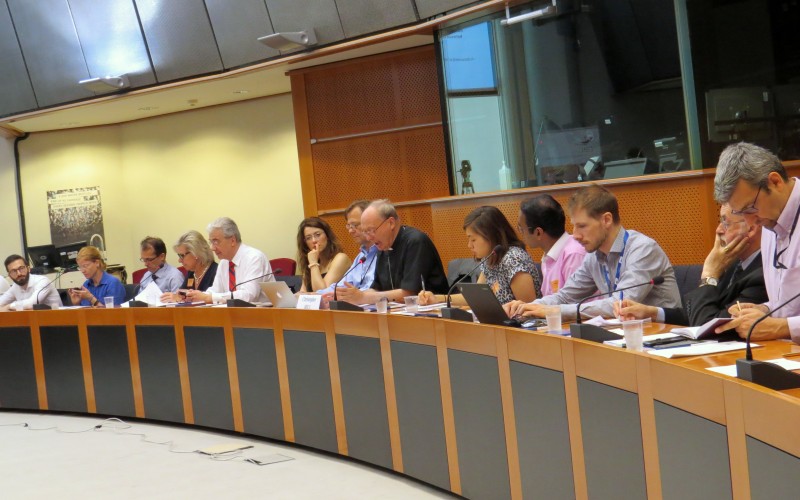Press Release No: 17/23
22 June 2017
Brussels
The Conference of European Churches convened a conference in the European Parliament today on its recent discussion document Beyond Prosperity? European Economic Governance as a Dialogue between Theology, Economics and Politics. The text brings together broader reflections prompted by multiple, interrelated crises, including the United Kingdom EU referendum, financial instability, and mass movement of migrants and refugees. These are paired with a pointed reflection on European economic governance, with specific policy recommendation emerging from the churches’ perspective.
The conference brought together representatives from CEC Member Churches, the European political institutions, and other civil society actors working in this area.
In his opening remarks, CEC President Rt Rev. Christopher Hill KCVO, DD emphasised the churches’ longstanding interest in economic governance, especially through commitment to education and health services and through their engagement for social cohesion, which is often framed in terms of the Common Good. He also stressed that Beyond Prosperity was meant to inspire discussion, rather than propose solutions.
An interdisciplinary panel of scholars, politicians working at the European level, and theologians, took up this challenge and addressed questions prompted by the text. Of primary concern was the relationship between subsidiarity and integration. The principle of subsidiarity, where decisions are made as close to citizens as possible, can be seen to be in tension with increased agreement and cooperation among EU Member States. Others saw no such tension, and encouraged those gathered to think of even local activities as somehow European. Panellists also discussed the challenge for European policy to reduce rising social inequality, especially in view of Beyond Prosperity’s emphasis on the equal footing of economic, social, and environmental policy. Other issues addressed included the role of transparency in democratizing and building confidence in European institutions, the global connection to many European problems, and the need for grassroots reform of financial institutions.
Through next year, CEC will continue preparations for its 2018 Novi Sad General Assembly, where the central theme will focus the future of Europe through the lens of the biblical imperative of witness, justice, and hospitality.
Digital copies of Beyond Prosperity? may be downloaded from the CEC website and print copies may be ordered through our publishing partner, Globethics.net. For a programme of today’s conference, please click here.
For more information or an interview, please contact:
Erin Green
Communication Coordinator
Conference of European Churches
Rue Joseph II, 174 B-1000 Brussels
Tel. +32 2 234 68 42
Fax +32 2 231 14 13
E-mail: eeg@cec-kek.be
Website: www.ceceurope.org
Facebook: www.facebook.com/ceceurope
Twitter: @ceceurope
The Conference of European Churches (CEC) is a fellowship of 115 Orthodox, Protestant, Anglican and Old Catholic Churches from all countries of Europe, plus 40 National Councils of Churches and Organisations in Partnership. CEC was founded in 1959. It has offices in Brussels and Strasbourg.
